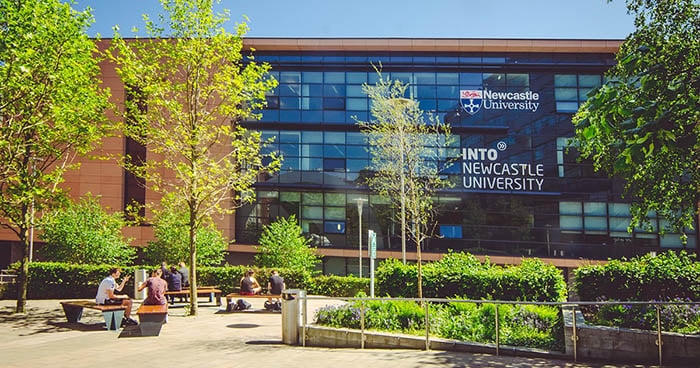Why is English important for international students?
5 February 2025 | By: Jenny Shippen | 3 min read
If you want to study at a UK university, knowledge of English is essential. Your degree will be taught in English and it will be the common language you share with friends.
Being confident in English as an international student has other benefits, too. Read on to find out why English is important for your UK university experience and your career.
Contents:
- Why do you need English to study in the UK?
- English is the business language of the world
- Knowledge of English enhances your resumé
- Speaking English can help you make friends at university
- English language support at Newcastle University
- Develop your English skills with INTO Newcastle
Why do you need English to study in the UK?
Part of the experience of studying abroad is the opportunity to improve your language skills. But in order to apply to a UK university, you will have to show you already have a certain level of English proficiency.
If English isn’t your first language, you will have to provide a recognised English language test or qualification.
The most widely recognised test is the International English Language Testing System (IELTS) Academic test. This measures your English skills in four main areas: listening, reading, writing, and speaking. You are given a score of 1 to 9 for each part of the test and an overall mark upon completion.
If you want to study at Newcastle University, our typical IELTS scores are IELTS 6.5 overall, with no less than IELTS 5.5 in each of the four skills elements. However, English language requirements for both our undergraduate and postgraduate degrees do vary depending on the degree.
To get the details of any scores you might need check the online course profile of your chosen degree by scrolling down to the section marked ‘Entry Requirements’.
We also accept other English language tests such as the Test of English as a Foreign Language (TOEFL) and Pearson Test of English Academic (PTE).
For more information, browse our English Language Requirements.
English is the business language of the world
Over 1.5 billion people worldwide speak English as their first or second language, making it the most common spoken language in the world ahead of Mandarin, Hindi, and Spanish.
A lingua-franca – a common language between speakers of different languages – English is used extensively in fields such as business, science, entertainment, and diplomacy. In fact, many high-profile companies choose English as their official corporate language.
If you want to study a degree in business or a business-related field, and you go on to a career in that area after university, being proficient in English will be a beneficial, if not essential, part of your job.
Being able to speak, read, and write in English will help you communicate more easily with others in the business world.
English proficiency may also be essential if your chosen career involves web content or design. English is the most frequently used language for web content, so there is a clear advantage to understanding the language used in 52% of the world’s websites.
Knowledge of English enhances your resumé
Being multilingual will impress future employers and look great on your resumé/curriculum vitae (CV).
With English as your second language, you will be prepared for a global workforce. You will have the skills to communicate with colleagues from around the world using English as your shared language.
It will also help you apply for jobs in the UK if you want to stay in the country after university.
Currently, to work in the UK after graduation, you will need to apply for a Graduate visa. This allows you to stay and work, or look for work, in the UK for two years after you have graduated. PhD graduates can stay for three years after graduation.
If you want to stay longer in the UK you could switch to a Skilled Worker visa – to apply for this visa you will also have to prove your knowledge of English.
Speaking English can help you make friends at university
Communication is key to making connections at university, and studying at a UK university means everyone will speak English as a shared language. Being able to talk confidently in English will make it easier for you to communicate and make friends with other students.
Knowing English can also help in your daily life outside of your studies, when you are shopping, travelling, socialising, or enjoying leisure activities.
English language support at Newcastle University
When you join us at Newcastle you will be able to access a range of support to further improve your English reading, writing, listening, and speaking skills.
Our free In-Sessional English programme offers six hours of additional classes a week, ranging from lectures to workshops and 1-to-1 tutorials. Classes are mostly in person, except for online writing tutorials.
You can also access our Academic Skills Kit as a means to sharpen your studying, writing, and assessment techniques – and improve your English skills in the process.
You can continue improving your English with the self-study resources offered by our Language Resource Centre. These are free to access and offer state-of-the-art language learning software to make learning fun and easy, as well as interactive courses and study materials in English.
And if you want to learn another language you can choose from self-study resources in over 100 languages, including 800 foreign language films, 40 satellite channels in 16 languages, hundreds of DVD titles and audio-visual material.

Develop your English skills with INTO Newcastle
INTO Newcastle is a purpose-built study centre in the heart of campus offering pre-university English language courses. These include:
- Academic English: designed to help you reach the academic standard needed for degree-level study. This course prepares you to apply to us.
- Pre-sessional English: an intensive course to help you develop the English language and academic skills needed for your degree. To apply for this course, you must be holding an offer of a place with us.
In partnership with INTO Newcastle we also offer subject-focused International Pathway Courses. You can study your academic subject and/or improve your English language skills.
Find out more:
- Check out our English Language Requirements.

We've been voted top in the UK for student life in the WhatUni Student Choice Awards 2025 - trusted recognition from real students.
